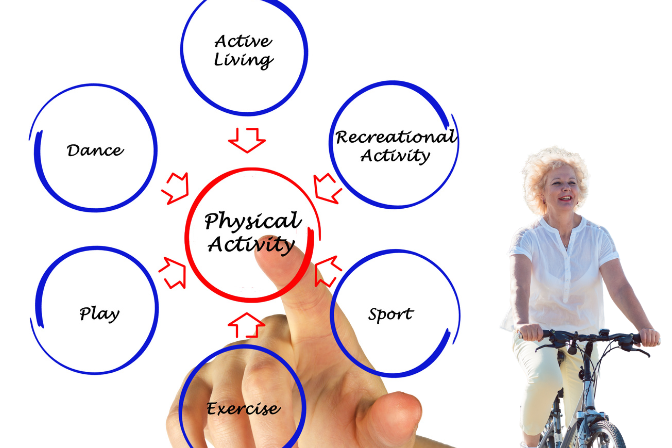Can Exercise and Physical Activity Help Stabilize Blood Sugar Levels During Menopause?
In this article, you will learn about the potential benefits of exercise and physical activity in stabilizing blood sugar levels during menopause. Menopause is a natural stage in a woman’s life that brings about hormonal changes, which can affect blood sugar regulation. However, engaging in regular exercise and physical activity can have a positive impact on blood sugar levels, helping to maintain stability and prevent fluctuations.
By incorporating exercise and physical activity into your routine, you can enhance insulin sensitivity, allowing your body to better regulate blood sugar levels. Physical activity can also contribute to weight management, which is crucial during menopause as weight gain is common and can further impact blood sugar control. Additionally, exercise can reduce stress levels, which is important as stress can negatively influence blood sugar regulation. So, if you are experiencing menopause-related changes in blood sugar levels, incorporating exercise and physical activity into your daily life may help stabilize them and improve your overall well-being.

Understanding Menopause
Definition of menopause
Menopause is a natural biological process that marks the end of a woman’s reproductive years. It is defined as the stage in a woman’s life when she no longer experiences menstrual periods for 12 consecutive months. Typically occurring between the ages of 45 and 55, menopause is a significant milestone in a woman’s life.
Hormonal changes during menopause
During menopause, the ovaries gradually produce less estrogen and progesterone. These hormonal changes can lead to various symptoms such as hot flashes, night sweats, mood swings, and vaginal dryness. Additionally, these hormonal fluctuations can also affect other aspects of a woman’s health, including blood sugar levels.
Effects of menopause on the body
Menopause is associated with several physiological changes in the body. These changes can impact various systems, including the cardiovascular system, bones, and metabolism. One specific effect of menopause is the potential disruption in blood sugar control, which can increase the risk of developing insulin resistance and other related health issues.
Blood Sugar Levels and Menopause
The relationship between menopause and blood sugar levels
Research suggests that the hormonal changes that occur during menopause can have an impact on blood sugar levels. Estrogen, a hormone that declines during menopause, plays a role in insulin sensitivity and glucose metabolism. As estrogen levels decrease, insulin sensitivity may decrease as well, leading to higher blood sugar levels.
Impact of hormonal fluctuations on blood sugar control
Hormonal fluctuations during menopause can contribute to irregular blood sugar levels. Fluctuating estrogen and progesterone levels can affect insulin sensitivity, resulting in more significant blood sugar spikes and dips. This instability in blood sugar control can lead to symptoms such as fatigue, mood swings, and an increased risk of developing diabetes.
Increased risk of developing insulin resistance
Insulin resistance occurs when the body’s cells become less responsive to insulin’s effects, leading to higher blood sugar levels. As women approach and enter menopause, the risk of developing insulin resistance increases. Insulin resistance can ultimately lead to the development of type 2 diabetes if left unmanaged.
Importance of Stabilizing Blood Sugar Levels
Effects of unstable blood sugar levels
Unstable blood sugar levels can have a significant impact on overall health and well-being. When blood sugar levels are consistently high or low, it can cause a variety of symptoms and complications. These can include fatigue, dizziness, difficulty concentrating, increased thirst, frequent urination, and changes in weight.
Increased risk of diabetes
Uncontrolled blood sugar levels also increase the risk of developing type 2 diabetes. Women going through menopause already have an elevated risk due to the hormonal changes taking place. By stabilizing blood sugar levels, you can decrease the risk of developing diabetes and its associated complications.
Potential complications of uncontrolled blood sugar
Uncontrolled blood sugar levels can lead to various long-term complications. These can include heart disease, stroke, kidney disease, nerve damage, vision problems, and poor wound healing. By effectively managing blood sugar levels, you can reduce the risk of these complications and maintain better overall health.
Exercise and Physical Activity
Benefits of exercise during menopause
Exercise is beneficial for women at all stages of life, including menopause. Engaging in regular physical activity can help alleviate many menopausal symptoms, improve cardiovascular health, strengthen bones, enhance mood, and manage weight. Additionally, exercise can play a crucial role in stabilizing and controlling blood sugar levels.
Effect on blood sugar levels
Exercise has the immediate effect of lowering blood sugar levels by increasing insulin sensitivity and glucose uptake in the muscles. Regular physical activity can also improve insulin sensitivity in the long term, making it easier for the body to maintain stable blood sugar levels.
Types of exercise recommended
Both aerobic exercise and strength training are recommended for women during menopause. Aerobic activities such as walking, jogging, swimming, or cycling can help improve cardiovascular health and burn calories. Strength training exercises, such as lifting weights or using resistance bands, can help maintain muscle mass and improve bone density.
Click Here to discover the Ultimate Fitness Routine for Ageless Women over 50

Exercise Guidelines for Blood Sugar Control
Frequency and duration of exercise
To effectively stabilize blood sugar levels, aim for at least 150 minutes of moderate-intensity aerobic activity or 75 minutes of vigorous-intensity aerobic activity per week. Additionally, include strength training exercises twice a week to maintain muscle mass and support bone health. It is essential to spread out the exercise sessions throughout the week for optimal results.
Intensity levels for optimal results
Moderate-intensity aerobic exercise should make you feel warm and slightly breathless. You should be able to carry on a conversation but not sing. Vigorous-intensity aerobic exercise will make you sweat, breathe harder, and make it more challenging to hold a conversation.
Combining aerobic and strength training
A combination of aerobic exercise and strength training provides the most comprehensive benefits for blood sugar control. Incorporating both types of exercise into your routine can help improve insulin sensitivity, burn calories, increase muscle mass, and support overall health and well-being.
Dietary Considerations for Blood Sugar Control
Importance of a balanced diet
In addition to exercise, maintaining a balanced diet is crucial for stabilizing blood sugar levels during menopause. Consuming a variety of nutrient-dense foods, including whole grains, lean proteins, fruits, vegetables, and healthy fats, can support overall health and help manage blood sugar levels.
Choosing complex carbohydrates over simple sugars
Complex carbohydrates, such as whole grains, vegetables, and legumes, are digested more slowly, resulting in a more gradual rise in blood sugar levels. Avoiding or limiting foods high in simple sugars, such as sugary drinks, desserts, and processed snacks, can help prevent blood sugar spikes.
The role of fiber and protein in blood sugar stabilization
Including adequate fiber and protein in your meals can help stabilize blood sugar levels. Fiber slows down digestion, preventing rapid fluctuations in blood sugar. Protein can help regulate blood sugar levels by providing a slower, more sustained release of glucose into the bloodstream. Incorporate foods such as fruits, vegetables, whole grains, lean meats, dairy products, and legumes into your diet for optimal blood sugar control.
Click Here to Learn more on Healthy Eating for Menopause Wellness

Other Lifestyle Factors
Impact of stress on blood sugar levels
Stress can have a significant impact on blood sugar levels. During times of stress, the body releases hormones that can raise blood sugar levels. Engaging in stress-reducing activities such as meditation, deep breathing exercises, yoga, or spending time with loved ones can help manage stress levels and promote blood sugar stability.
Getting adequate sleep
Getting sufficient sleep is essential for overall health, including blood sugar control. Lack of sleep can affect hormone levels and increase inflammation, leading to insulin resistance and blood sugar imbalances. Aim for 7-9 hours of quality sleep each night to support hormonal balance and blood sugar stability.
Maintaining a healthy body weight
Maintaining a healthy body weight is essential for managing blood sugar levels during menopause. Excess weight, especially around the waistline, can contribute to insulin resistance and higher blood sugar levels. Regular exercise and a balanced diet can help achieve and maintain a healthy weight and promote better blood sugar control.
Monitoring and Managing Blood Sugar Levels

Regular blood sugar monitoring
Regular blood sugar monitoring is essential for managing blood sugar levels effectively. Monitoring can help identify patterns and guide adjustments to exercise, diet, and medication if needed. Consult with your healthcare professional for guidance on how often and when to monitor your blood sugar levels.
Consulting with a healthcare professional
When it comes to managing blood sugar levels during menopause, consulting with a healthcare professional is crucial. They can provide personalized advice, guidance, and support tailored to your specific needs and medical history. They can help develop a comprehensive plan that incorporates exercise, diet, and any necessary medications.
Potential use of medication or insulin
In some cases, medication or insulin may be necessary to manage blood sugar levels during menopause. Your healthcare professional can determine if medication is appropriate for you based on your individual needs and health status. It is important to follow their recommendations and regularly adjust the treatment plan as needed.
Learn the Symptoms of Blood Sugar Issues During Menopause
Success Stories and Testimonials
Real-life experiences of women stabilizing blood sugar through exercise
Many women have found success in stabilizing their blood sugar levels through exercise during menopause. By incorporating regular physical activity into their routines, they have experienced improved blood sugar control, increased energy levels, and an overall enhanced quality of life.
Positive outcomes and improved quality of life
Women who have effectively stabilized their blood sugar levels through exercise have reported a range of positive outcomes. These include improved mood, better sleep, increased confidence, weight management, and reduced menopausal symptoms. The combination of exercise, proper diet, and lifestyle changes has resulted in an overall improved quality of life.
Inspiration and motivation for others
The success stories and testimonials from women who have stabilized their blood sugar levels during menopause serve as inspiration and motivation for others. Their experiences demonstrate that exercise and physical activity can make a significant difference in managing blood sugar levels and overall well-being. By sharing their stories, these women inspire others to take control of their health and embrace a healthy, active lifestyle.
Conclusion
Can exercise and physical activity help stabilize blood sugar levels during menopause? The answer is a resounding yes. Engaging in regular exercise, combined with a balanced diet and other healthy lifestyle choices, can play a crucial role in controlling blood sugar levels during menopause. By following exercise guidelines, making dietary considerations, and focusing on other lifestyle factors, women can effectively manage their blood sugar levels and reduce the risk of complications associated with uncontrolled blood sugar. Remember to consult with your healthcare professional for personalized advice and guidance, providing you with the tools you need to thrive during this transformative stage of life.







